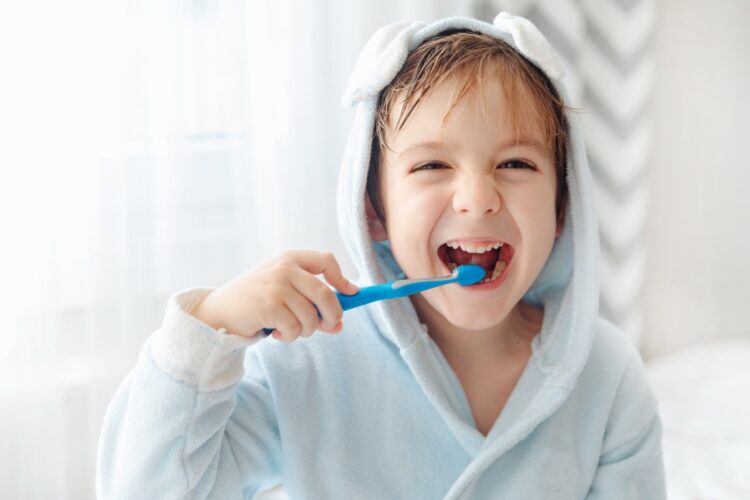 A child’s early adolescence is extremely important for developing proper dental hygiene habits. Not only can ignoring care for a baby’s gums and first teeth have long-lasting implications — baby teeth that fall out too early can reduce the space in the mouth needed for incoming adult teeth; the likelihood of children contracting an oral disease later in life, like tooth decay, raises significantly — but this time to lay down good habits and get your children started on the right foot will never come again. Unlike sharks and alligators, we don’t regenerate our adult teeth when they fall out; when they’re gone, they’re gone!
A child’s early adolescence is extremely important for developing proper dental hygiene habits. Not only can ignoring care for a baby’s gums and first teeth have long-lasting implications — baby teeth that fall out too early can reduce the space in the mouth needed for incoming adult teeth; the likelihood of children contracting an oral disease later in life, like tooth decay, raises significantly — but this time to lay down good habits and get your children started on the right foot will never come again. Unlike sharks and alligators, we don’t regenerate our adult teeth when they fall out; when they’re gone, they’re gone!
Starting Off Right
Developing good oral hygiene habits really can’t start early enough. According to the American Dental Association (ADA), caring for your child’s teeth can start as early as a few days after birth. Getting in the habit of wiping their gums with a clean, wet washcloth will not only prepare you for when teeth start to emerge, but will also help keep their mouths free of harmful bacteria. For the first six months of your baby’s life, you essentially act as their first pediatric dentist, providing care for them until, traditionally, their two lower incisors make their debut.
First Teeth and Dental Services
Once your baby’s first tooth has broken through the gums, the daily regimen of brushing must begin. Using this occasion to call your child’s pediatric dentistry for their first visit is also advisable. Parents might wonder why everything needs to start so early; where is this sense of urgency coming from? Here are the facts:
- 20% of children ages 5 – 11 suffer from tooth decay.
- Tooth decay is the most common childhood illness (5x more common than asthma).
- If left untreated, even in baby teeth, tooth decay can lead to gum disease and other sometimes life-threatening illnesses. Bacteria from rotting teeth can get into the bloodstream and cause health scares like sepsis, meningitis, and blood poisoning.
- Tooth decay is caused by bacteria, many of which are airborne. Meaning, children can pass cavities to one another just by breathing!
Introducing your child to a pediatric dentist before their first birthday is essential to helping your child develop good oral hygiene practices early on, as well as spotting any problems before they become a major issue.
The Role of the Pediatric Dentist
Besides the obvious benefit of having a professional look over your child’s mouth for potential problems, making regular visits to your child’s pediatric dentistry can be great for you and your child to get educated on good hygiene practices. By bringing your child to meet their dentist early, you:
- Help them become accustomed to visiting the dentist, thus reducing any fear they might have.
- Let them see that you take oral hygiene seriously, as their parent.
- Help them get educated on why it’s important to brush regularly, as well as teach them how to brush.
- Let your children hear from another adult that cavities are bad but preventable.
Regular dental services are essential to developing good oral hygiene practices early on in childhood. Hopefully, visiting the dentist won’t seem like such a big step if your child’s earliest memories include brushing their teeth and gums after their first meal and before bed each day.




